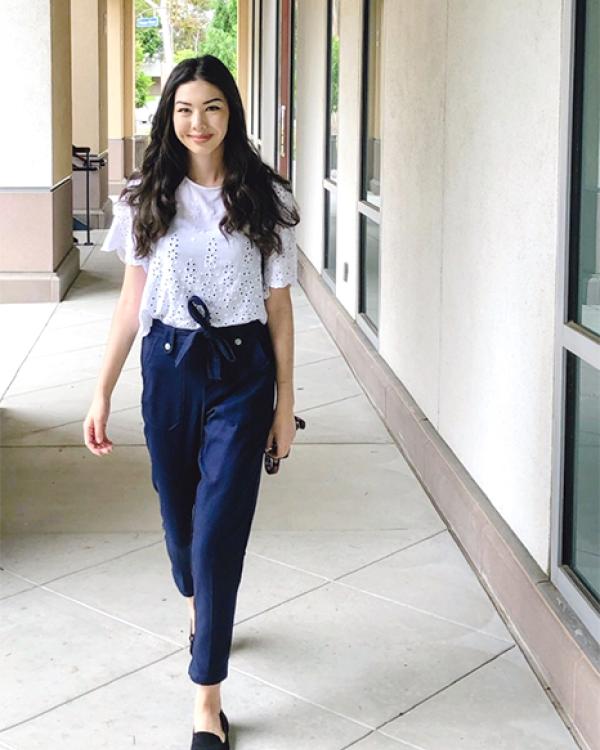
This week we caught up with Alyssa Hudson, a Teacher Education Program candidate working towards an Education Specialist Credential with an emphasis in Mild/Moderate Disabilities and a Master's of Education. Alyssa received a Bachelor of Arts degree in Sociology with minors in Applied Psychology and Education from UCSB in 2019. Throughout her undergraduate career, Alyssa worked as a Social-Emotional Learning (SEL) educator for high-risk K-6 students at Harding University Partnership School. She also contributed to the START-YA autism intervention program at the Koegel Autism Center as a Research Assistant (2018-2019), as well as a captain of the Power of Play pro-social recess program led by Dr. Shane Jimerson (2017-2019). Alyssa’s research interests include improving intervention programs for children with learning disabilities through SEL strategies and expanding collaboration between general education and special education teachers.
GGSE: While an undergraduate at UCSB, you completed two of the school's minors--Applied Psychology and Education Studies. What was that like?
Hudson: As a freshman undergraduate, I always used to walk past the Education Building hoping that one day I could take a class there because I loved education and the building was so unfamiliar. When I found that I could fit the Applied Psych and Education minors in my schedule I was so excited. My undergraduate experiences in the two minors were some of my favorites. Both minors work closely with one another, allowing students to get involved in educational fieldwork and work with some of the best school psychologists. I had the privilege of taking CNCSP 197 for almost three years with Dr. Shane Jimerson. This is an applied psychology minor course where undergraduate students go to local elementary schools to play with students at recess and engage them in positive social interactions as well as promoting conflict resolution. This course as well as many others really inspired me to continue working with students in a school setting to further their growth and achievement. These courses also gave me insight into the many socio-economic and cultural inequalities that lie within school systems and I wanted to find a way to help. I recommend this minor to anyone who enjoys working with children, helping others, or is interested in education, as it gave me the opportunity to pursue the career I am working towards now.
GGSE: What made you choose to stay at UCSB to get your credential and M.Ed. after earning your BA here?
Hudson: I chose to stay at UCSB to get my Education Special Credential (ESC) and M.Ed because the Teacher Education Program offered at UCSB is only one year long and I wanted to continue working with the demographic of students in Santa Barbara schools. I learned so much as an undergraduate, I was not ready to leave yet. I heard that the TEP program was challenging yet rewarding and very supportive. I did not know a lot about special education other than what I had heard from my mother’s experiences as a paraprofessional in the field and I wanted to learn more. Eventually, I would like to go into school psychology. I feel that becoming a sped teacher is a great way to learn about the varying roles in special education, and thus would improve my ability to help students as a psychologist in the future.
GGSE: You worked a lot at Harding prior to entering TEP, in a variety of programs. How has all that experience helped you as you become a special education teacher?
Hudson: I worked at Harding University Partnership School as a Social Emotional Learning (SEL) educator for two years as an undergraduate and this past year as a student teacher. These experiences have been vital to my future career as I had the opportunity to work with so many different faculty members. I learned how their Speech and Language program worked, sat in on IEP meetings, helped write a psychoeducational report, and made many great student relationships along the way. As a student teacher there, I worked in a mild/moderate resource room with approximately 20 students. Initially, I was nervous to lead small groups of students, but by the end of my experience I was able to take over the classroom, develop extensive lesson plans, and administer assessments. Being a part of two different programs within the school taught me how intertwined school support systems are, all working together to improve student achievement and well-being.
GGSE: Assuming you have any free time, what do you like to do with it?
Hudson: Outside of school, I enjoy traveling home to visit my family, as well as painting. I am very close with my family so I try to visit as often as I can. When I am not at home, I spend my time painting and doing crafts with my friends. We are all very creative, whether it’s making jewelry, doing fun makeup, or redecorating our rooms for the millionth time. If I am not painting or driving to my hometown, I am more than likely napping. Graduate school is fun, challenging, and inspiring, but more than anything, it is tiring!